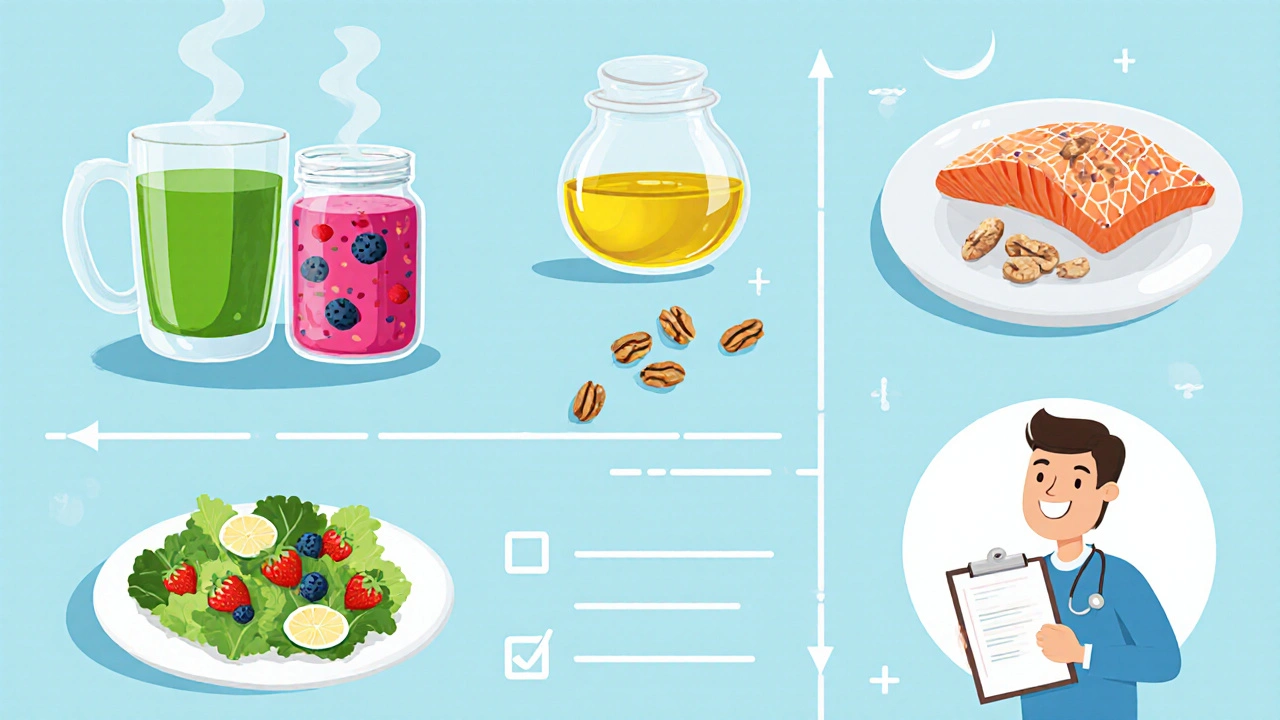How Antioxidants Help Prevent Coronary Artery Disease - A Complete Guide
 Oct, 19 2025
Oct, 19 2025
Antioxidant Intake Calculator
Research shows that a diet rich in antioxidants can reduce coronary artery disease risk by 15-20%. This calculator uses ORAC values from the article to estimate your daily antioxidant intake and potential risk reduction.
Total Antioxidant Intake
0 ORAC units
Potential Risk Reduction
0%
Based on research, a daily antioxidant intake of 5,000 ORAC units or more may provide up to a 20% reduction in coronary artery disease risk.
This calculator uses ORAC values from the article as a guide. Individual results may vary based on factors like metabolism, genetic predispositions, and other lifestyle choices.
When we talk about Antioxidants are molecules that stop oxidation by neutralizing free radicals, thereby protecting cells from damage, we’re diving into a cornerstone of heart‑health strategy.
Why Oxidative Stress Matters for the Heart
Free radicals are highly reactive atoms or molecules that steal electrons from nearby cells, creating a cascade of damage. In the arterial wall, this process is called Oxidative stress an imbalance between free‑radical production and the body’s ability to detoxify them. When oxidative stress persists, low‑density lipoprotein (LDL cholesterol the “bad” cholesterol that deposits in artery walls) becomes oxidized, attracting immune cells and sparking inflammation.
The inflamed plaque gradually hardens into Atherosclerosis the buildup of fatty deposits that narrow arteries and limit blood flow. Over time, these plaques can rupture, forming a clot that blocks the coronary artery and triggers a heart attack.
What Exactly Are Antioxidants?
Antioxidants come in two broad families: enzymatic (like superoxide dismutase, catalase, and glutathione peroxidase) and non‑enzymatic (vitamins, minerals, and plant‑derived compounds). Non‑enzymatic antioxidants that people consume most often include vitamin C, vitamin E, beta‑carotene, and a wide range of polyphenols such as flavonoids and resveratrol.
Each antioxidant works by donating an electron to a free radical, stabilizing it without becoming a damaging radical itself. Think of it as a neutralizing handshake that stops the chain reaction in its tracks.
Evidence Linking Antioxidants to Coronary Artery Disease Prevention
Many epidemiological studies have shown an inverse relationship between high antioxidant intake and coronary artery disease (Coronary artery disease a condition where plaque builds up in the coronary arteries, reducing blood flow to the heart muscle). For instance, the Mediterranean‑style diet-rich in fruits, vegetables, olive oil, nuts, and wine-correlates with a 30% lower risk of heart attacks over a 10‑year follow‑up.
Randomized controlled trials (RCTs) provide a more nuanced picture. Early trials with vitamin E alone showed modest benefits, but later, larger RCTs like the HOPE‑TOO study found no significant reduction in major cardiovascular events when vitamin E was taken in isolation. The key takeaway is that antioxidants work best as part of a whole‑food pattern rather than as a single‑pill solution.
Recent meta‑analyses of polyphenol‑rich foods (berries, tea, dark chocolate) suggest a 15-20% risk reduction for coronary events, especially when combined with lifestyle factors such as regular exercise and non‑smoking.

Best Dietary Sources of Heart‑Healthy Antioxidants
| Food | Key Antioxidant(s) | Typical Serving | Antioxidant Capacity (ORAC*) |
|---|---|---|---|
| Blueberries | Anthocyanins, Vitamin C | 1 cup | 9,000 |
| Dark Chocolate (70%+) | Flavonoids (epicatechin) | 30 g | 7,200 |
| Extra‑Virgin Olive Oil | Polyphenols (hydroxytyrosol) | 2 tbsp | 5,500 |
| Green Tea | Catechins (EGCG) | 1 cup | 4,800 |
| Walnuts | Vitamin E, Polyphenols | ¼ cup | 3,900 |
ORAC stands for Oxygen Radical Absorbance Capacity, a lab‑based measure of a food’s antioxidant power. While ORAC values don’t directly translate to clinical outcomes, they provide a useful ranking for food choices.
Supplementation: When, How, and What to Watch For
Not everyone can meet their antioxidant needs through diet alone-busy schedules, poor access to fresh produce, or specific medical conditions can create gaps. In such cases, supplements may help, but they must be chosen carefully.
- Vitamin C: 500-1000 mg twice daily is generally safe and may improve endothelial function.
- Vitamin E: D‑alpha‑tocopherol 200 IU per day. Higher doses can interfere with blood clotting, especially when combined with anticoagulants.
- Coenzyme Q10: 100-200 mg per day. Particularly useful for patients on statins, as statins can lower CoQ10 levels.
- Polyphenol extracts (e.g., grape seed, curcumin): Look for standardized preparations with ≥95% active compounds.
Always discuss supplements with a healthcare provider, especially if you’re taking Statins cholesterol‑lowering drugs that can interact with certain antioxidants. Some combinations may increase the risk of muscle pain or liver enzyme changes.

Practical Checklist for Building an Antioxidant‑Rich Heart‑Healthy Routine
- Start each day with a fruit‑rich smoothie (berries + spinach + a splash of orange juice) to hit a dose of vitamin C and anthocyanins.
- Swap butter for extra‑virgin olive oil in cooking; aim for at least two tablespoons daily.
- Snack on a handful of walnuts or almonds instead of processed chips.
- Replace sugary drinks with green tea or herbal teas; brew for 3-5 minutes to release catechins.
- Include at least two servings of fatty fish per week; omega‑3s complement antioxidant actions by reducing inflammation.
- If you smoke, quit. Smoking creates massive free‑radical loads that overwhelm even the best diet.
- Schedule an annual check‑up: lipid panel, hs‑CRP (inflammation marker), and a brief discussion on supplement use.
Following this checklist consistently can lower oxidative stress markers and improve vascular function, which together blunt the progression of coronary artery disease.
Frequently Asked Questions
Can antioxidants completely prevent heart attacks?
No single factor can guarantee prevention. Antioxidants reduce one of many risk pathways-oxidative damage-but heart health also depends on blood pressure, glucose control, activity level, and genetics.
Is it better to get antioxidants from food or supplements?
Whole foods deliver a synergistic blend of antioxidants, fiber, and micronutrients that work together. Supplements can fill gaps, but they lack the complex matrix found in fruits, vegetables, and nuts.
How much vitamin C is safe for heart health?
The tolerable upper intake level for adults is 2,000 mg per day. Doses of 500-1,000 mg split into two servings are commonly used in studies without side effects.
Do antioxidant‑rich diets work for everyone?
Most people benefit, but individuals with certain genetic conditions (e.g., specific APOE variants) may respond differently. Personal medical history should guide any intensive dietary shift.
Can I take antioxidant supplements while on statins?
Yes, but choose low‑dose vitamin E and avoid high‑dose grapefruit‑derived supplements, which can increase statin levels and risk side effects. Always consult your physician.
What lifestyle factors amplify the benefits of antioxidants?
Regular aerobic exercise, adequate sleep, stress management, and not smoking dramatically boost the protective effect of dietary antioxidants.
How quickly can I expect to see changes in blood markers?
Studies show improvements in oxidative stress biomarkers (e.g., reduced malondialdehyde) within 4-6 weeks of a high‑antioxidant diet, while lipid profile changes may take 3-6 months.
Bottom line: antioxidants aren’t a magic bullet, but they’re a proven, low‑risk tool that, when combined with a heart‑smart lifestyle, can meaningfully slow the march of coronary artery disease.

ashanti barrett
October 19, 2025 AT 12:18Honestly, I’ve seen my dad’s cholesterol improve just by adding a handful of blueberries to his breakfast.
Leo Chan
November 3, 2025 AT 12:24If you’re already adding berries, you might also toss in some spinach and a splash of orange juice for extra vitamin C and flavonoids. That combo keeps the antioxidant synergy humming all morning and feeds your gut with fiber too.
jagdish soni
November 17, 2025 AT 09:44One must recognize that the discourse surrounding polyphenols has been overly simplistic; the reductionist view that ‘more is better’ neglects the nuanced pharmacokinetics inherent to flavonoid metabolism. In reality, the bioavailability of these compounds is modulated by gut microbiota composition, which varies dramatically across individuals.
Monika Bozkurt
November 30, 2025 AT 03:18Indeed, a comprehensive appraisal of antioxidant efficacy necessitates consideration of both pharmacodynamic and pharmacokinetic parameters. The interplay between intestinal enzymatic deconjugation and hepatic phase‑II metabolism governs plasma concentrations of catechins and anthocyanins, thereby influencing their vascular protective capacity.
Christopher Burczyk
December 11, 2025 AT 17:04Let us examine the evidence base with the rigor it deserves. Numerous randomized controlled trials have attempted to isolate the effect of isolated vitamin E supplementation, yet the majority have failed to demonstrate a statistically significant reduction in major adverse cardiac events. This failure is not merely a null result; it underscores the importance of context in nutrient biology. Antioxidants operate within a complex matrix of dietary constituents, and their isolated administration cannot replicate the synergistic interactions present in whole foods. Moreover, the heterogeneity of study populations-varying in baseline oxidative stress, comorbidities, and genetic predispositions-further dilutes any singular effect. Meta‑analyses of polyphenol‑rich interventions reveal modest risk reductions, but these benefits are consistently accompanied by concurrent lifestyle modifications such as increased physical activity and smoking cessation. It is also critical to acknowledge the dose‑response curve; supraphysiologic doses of certain antioxidants may paradoxically exert pro‑oxidant effects, thereby negating potential benefits. The mechanistic pathway involves the Fenton reaction, wherein excess supplemental vitamin C can catalyze free radical formation under specific ionic conditions. Clinical guidelines therefore recommend a food‑first approach, emphasizing Mediterranean‑style dietary patterns rich in fruits, vegetables, nuts, and olive oil. These patterns inherently provide a balanced spectrum of antioxidant enzymes, vitamins, and trace minerals, fostering endogenous oxidative defense systems. In practice, patients should be counseled to prioritize whole‑food sources and reserve supplementation for documented deficiencies or specific therapeutic indications. Finally, regular monitoring of lipid panels, inflammatory markers such as hs‑CRP, and oxidative stress biomarkers can help tailor interventions to individual risk profiles.
Nicole Boyle
December 22, 2025 AT 03:04The practical takeaway here is to weave antioxidant‑rich foods into everyday meals rather than rely on a pill. For example, swapping a sugary snack for a handful of walnuts not only delivers vitamin E and polyphenols but also provides healthy monounsaturated fats that support lipid profiles.
Keeping a simple grocery list-berries, dark chocolate, extra‑virgin olive oil, green tea-makes the habit sustainable without overwhelming the kitchen routine.
Caroline Keller
December 31, 2025 AT 09:18Reading this felt like a lecture on how to eat a rainbow.
dennis turcios
January 9, 2026 AT 15:31While colorful plates are aesthetically pleasing, the real issue is that many people overlook portion control, assuming that more antioxidants automatically translate to better outcomes. This misconception can lead to excess caloric intake, especially when high‑calorie foods like dark chocolate are consumed without moderation.